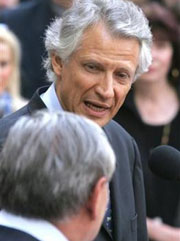|
 |
| Newly appointed French Prime Minister Dominique
de Villepin, top, looks at his predecessor Jean-Pierre Raffarin
after the handover ceremony, on the steps of the premier's office in
Paris Tuesday, May 31, 2005.(AP) |
French President Jacques Chirac named loyalist
Dominique de Villepin as his new prime minister on Tuesday in a shake-up
of the government following his crushing
defeat over the European Union constitution.
Villepin replaces the unpopular Jean-Pierre Raffarin who quit earlier
on Tuesday. He is a former interior and foreign minister who angered the
United States but won French hearts with his fierce opposition to the
U.S.-led war in Iraq.
He now has the task of reshaping government policy
after voters showed their distaste
for Raffarin's economic policies and high unemployment in
Sunday's vote on the EU charter.
Chirac and Villepin, 51, did not immediately unveil the new government,
which is expected to be announced on Wednesday. Some political
commentators predict a slimmed-down cabinet.
The president was due to address the nation later on Tuesday and lay
out policy for the new team, which will hope to govern France until
presidential and parliamentary elections in 2007.
Villepin saw off a challenge from Nicolas Sarkozy, a Chirac rival for
the presidency who leads the governing Union for a Popular Majority (UMP)
party, who had all but demanded the prime minister's job for himself on
Sunday.
French political commentators said there was persistent speculation
that Sarkozy, 50, could return to the government as interior minister and
Villepin's number two -- as well as remaining the leader of the UMP.
In a short statement, Raffarin defended his record over the past three
years and said Sunday's defeat had not triggered his decision.
"I took this decision independently of the outcome of the referendum on
the European constitution," he said.
Promotion of the loyal Villepin could be a sign Chirac intends to fight
back after the referendum humiliation and keep open his options for
seeking a third term in 2007.
A career diplomat, aristocrat and sometime poet,
Villepin won applause at the United Nations and plaudits
at home on the right and the left for
opposing the U.S.-led war in Iraq, but angered and frustrated Washington.
Washington and Paris have since been rebuilding ties.
Villepin's appointment is likely to go down well with European allies.
At home, Villepin's priority will be to create jobs in an economy
burdened with 10.2 percent unemployment, a more than five-year high, to
boost growth and curb public spending.
Although he will have the president's full support, Villepin has little
experience in the rough and tumble of domestic politics. He has never
stood for election and has prickly relations with the parliamentary
majority he now relies on.
In 1997, Villepin was a prime mover behind Chirac's early dissolution
of parliament, which saw a conservative majority blown away by a
Socialist-led coalition.
The disaster earned him the nickname "Nero," a reference to the emperor
who famously left Rome in flames.
(Agencies) | 